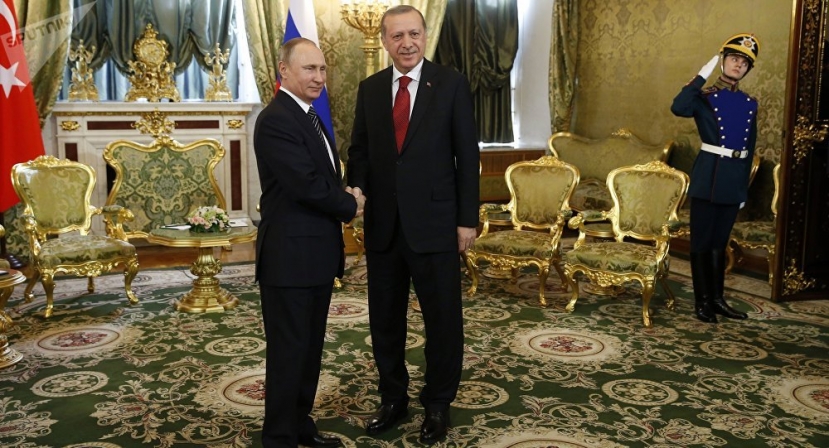Putin-Erdogan Talks to Give Fresh Impetus to Russian-Turkish Relations
28.09.2017 08:48
 Putin-Erdogan Talks to Give Fresh Impetus to Russian-Turkish Relations
Putin-Erdogan Talks to Give Fresh Impetus to Russian-Turkish Relations
Military and political cooperation, the Kurdish issue, the Syrian crisis and other important issues are expected to dominate the agenda between Russian President Vladimir Putin and his Turkish counterpart Recep Tayyip Erdogan later today in Ankara, according to experts.
Earlier this week, the Kremlin press service said in a statement that during their working meeting in Ankara, Putin and Erdogan will continue exchanging views on regional and bilateral agendas.
Sputnik reached out to experts to discuss the current state of Russian-Turkish relations and the possible outcome of the upcoming talks between the two leaders.
According to Ahmet Berat Çonkar, a Turkish lawmaker from the ruling Justice and Development Party (AKP) and co-chairman of the Russia-Turkey Public Forum, the talks will contribute to the development of bilateral cooperation on a range of issues.
"This visit is a signal of positive dynamics in bilateral relations. The leaders of both countries have been involved in an exchange of opinions and joint consultations. What is important is that Moscow and Ankara have deepened their cooperation, including on regional stability and the situation in Syria and Iraq," Çonkar told Sputnik Turkey.
As to the possible meeting agenda, the Turkish lawmaker suggested that Putin and Erdogan are likely to discuss closer bilateral cooperation between Russia and Turkey on the most important international issues, including the escalation on the Korean peninsula, relations with the United States and the Rohingya crisis in Myanmar.
Military and Political Cooperation, S-400 Deal
The upcoming meeting is an opportunity to take bilateral relations to a brand-new level, according to Volkan Özdemir, director of the Institute for Energy Markets and Policy (EPPEN).
The expert suggested that the talks will focus on the military and political component of Moscow-Ankara ties which have been recently expanding.
"Since August 2016, Russia and Turkey have been actively developing military and political cooperation, primarily on the Syrian crisis. At the time, the groundwork was laid for an important future military and political deal. Since then, this cooperation has been positive for Syria. Moreover, Moscow and Ankara have signed a deal on the delivery of the Russian S-400 [missile defense system] to Turkey. There have also been several important regional agreements between Russia, Turkey, Iran and Iraq," Özdemir said.
The expert also said that the talks could lay the foundation for transforming current cooperation into the form of an "alliance between Moscow and Ankara."
Prof. Natalia Ulchenko, a senior expert with the Institute for Eastern Studies at the Russian Academy of Sciences, pointed out that despite their remaining differences, Russia-Turkey relations have seen significant progress over the past year.
"The dynamics have been positive. Apparently, Moscow and Ankara are ready to listen to each other and make concessions. For example, the S-400 was unexpected taking into account the fact that Turkey is integrated with NATO’s military standards. But this is yet another proof that a compromise is always possible," Ulchenko said.
Commenting further, she also suggested that during their talks Putin and Erdogan are likely to discuss the Kurdish problem, an issue that requires dialogue between Moscow and Ankara.
"We’ll see what [this dialogue] will look like and what results it will produce. Possibly, there are some points for cooperation," she added.
In turn, Russian lawmaker Dmitry Saveliev, deputy coordinator of the Russia-Turkey Parliamentary Friendship Group, commented that Russia and Turkey are currently actively developing political ties and there is a need for an alliance between Moscow and Ankara.
"Turkey is a very important player in the political arena. Currently, a major continental Eurasian block is taking shape and both Russia and Turkey are part of the trend. This means serious advantages in the long-run," Saveliev said.
